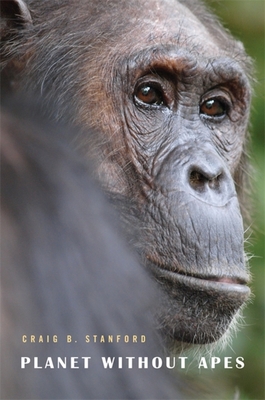

 Belknap Press
Belknap Press
Planet Without Apes


Key Metrics
- Craig Stanford
- Belknap Press
- Paperback
- 9780674416840
- 7.71 X 5.05 X 0.72 inches
- 0.57 pounds
- Nature > Animals - Primates
- English
 Secure Transaction
Secure TransactionBook Description
Planet Without Apes demands that we consider whether we can live with the consequences of wiping our closest relatives off the face of the Earth. Leading primatologist Craig Stanford warns that extinction of the great apes--chimpanzees, bonobos, gorillas, and orangutans--threatens to become a reality within just a few human generations. We are on the verge of losing the last links to our evolutionary past, and to all the biological knowledge about ourselves that would die along with them. The crisis we face is tantamount to standing aside while our last extended family members vanish from the planet.
Stanford sees great apes as not only intelligent but also possessed of a culture: both toolmakers and social beings capable of passing cultural knowledge down through generations. Compelled by his field research to take up the cause of conservation, he is unequivocal about where responsibility for extinction of these species lies. Our extermination campaign against the great apes has been as brutal as the genocide we have long practiced on one another. Stanford shows how complicity is shared by people far removed from apes' shrinking habitats. We learn about extinction's complex links with cell phones, European meat eaters, and ecotourism, along with the effects of Ebola virus, poverty, and political instability.
Even the most environmentally concerned observers are unaware of many specific threats faced by great apes. Stanford fills us in, and then tells us how we can redirect the course of an otherwise bleak future.
Author Bio
Craig Stanford is a biological anthropologist and professor of Anthropology and Biological Sciences at USC, and has conducted extensive field research on wild great apes, monkeys, and other animals. His work has often focused on the ecological relationships among the primate species sharing a tropical forest ecosystem.
He has conducted field studies in East Africa, South Asia, Southeast Asia, and Central and South America. In addition to 15 years research on chimpanzee behavioral ecology in East Africa, he has recently been collaborating in studies on endangered Asian primates and other animals.
The author of more than a dozen books and 100 scholarly articles, he also holds a research appointment in vertebrate biology at the Los Angeles County Museum of Natural History, and is involved in the biology and conservation of endangered tortoises in southeast Asia.
Source: University of Southern California
Videos










Community reviews
Write a ReviewNo Community reviews